Background
Joseph Hanlon was born on June 15, 1941.

Joseph Hanlon, educator, journalist, writer, author, researcher.
Joseph Hanlon, educator, journalist, writer, author, researcher.
77 Massachusetts Ave, Cambridge, MA 02139, United States
Joseph Hanlon earned a bachelor's degree from Massachusetts Institute of Technology.
419 Boston Ave, Medford, MA 02155, United States
Joseph Hanlon earned a Doctor of Philosophy in physics from Tufts University.





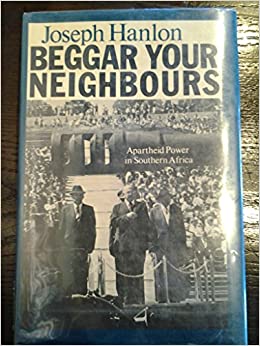
(Joseph Hanlon pieces together the details of South Africa...)
Joseph Hanlon pieces together the details of South Africa's military attacks on its neighbors and relates them to the control the South African state exercises through its economic power.
https://www.amazon.com/Beggar-Your-Neighbors-Apartheid-Southern/dp/0253331315/ref=sr_1_1?dchild=1&keywords=Beggar+Your+Neighbors&qid=1594889599&sr=8-1
1986
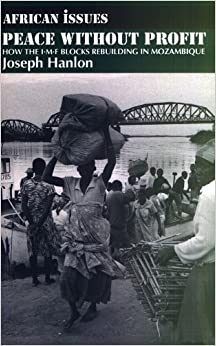
(This book argues that following the dictates of the IMF/W...)
This book argues that following the dictates of the IMF/World Bank has prevented Mozambique from rebuilding itself, and asks whether aid can ameliorate the distortions imposed by these organizations. The author explains the donor case and considers what lessons there are for other African countries which must follow Mozambique's experience - Liberia, Rwanda, Zaire, Somalia, Sudan, and Angola.
https://www.amazon.com/Peace-without-Profit-Rebuilding-Mozambique/dp/0852558007/ref=sr_1_1?dchild=1&keywords=Peace+without+Profit%3A+How+the+IMF+Blocks+Rebuilding+in+Mozambique&qid=1594889819&sr=8-1
1996
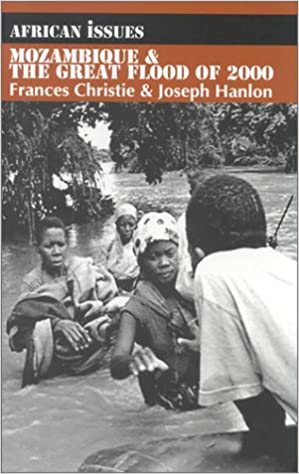
(Frances Christie and Joseph Hanlon examine the causes (bo...)
Frances Christie and Joseph Hanlon examine the causes (both natural and human-made) of the floods and the nature of the relief effort. Asking what went right, what went wrong, and what lessons might be learned from this case, they find that the relief effort was largely a success of international cooperation. Mozambique and the Great Flood of 2000 probes the effectiveness of various forms of aid, the extent of cooperation among agencies and governments, the amount of money raised through international public appeals, the use of relief funds, and the effectiveness of initial efforts at reconstruction.
https://www.amazon.com/Mozambique-Great-Flood-African-Issues/dp/0253339782/ref=sr_1_1?dchild=1&keywords=Mozambique+and+the+Great+Flood+of+2000&qid=1594889951&sr=8-1
2001
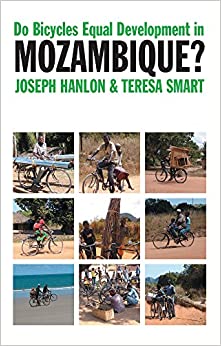
(Is Mozambique an African success story? It has 7 percent ...)
Is Mozambique an African success story? It has 7 percent a year growth rate and substantial foreign investment. Fifteen years after the war of destabilization, the peace has held. Mozambique is the donors' model pupil, carefully following their prescriptions and receiving more than a billion dollars a year in aid. The number of bicycles has doubled and this is often cited as the symbol of development. In this book the authors challenge some key assumptions of both the donors and the government and ask questions such as whether there has been too much stress on the Millennium Development Goals and too little support for economic development; if it makes sense to target the poorest of the poor, or would it be better to target those who create the jobs which will employ the poor; whether there has been too much emphasis on foreign investment and too little on developing domestic capital; and if the private sector really will end poverty, or must there be a stronger role for the state in the economy?
https://www.amazon.com/gp/product/B07QBCVRHN/ref=dbs_a_def_rwt_hsch_vapi_taft_p1_i0
2008
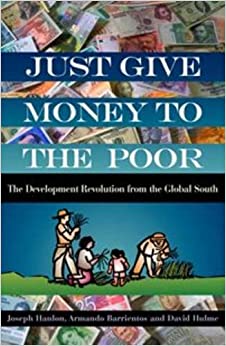
(Team authored by foremost scholars in the development fie...)
Team authored by foremost scholars in the development field Amid all the complicated economic theories about the causes and solutions to poverty, one idea is so basic it seems radical: just give money to the poor. Despite its skeptics, researchers have found again and again that cash transfers given to significant portions of the population transform the lives of recipients.
https://www.amazon.com/gp/product/1565493346/ref=dbs_a_def_rwt_hsch_vapi_taft_p1_i1
2010

(The news from Zimbabwe is usually unremittingly bleak. Pe...)
The news from Zimbabwe is usually unremittingly bleak. Perhaps no issue has aroused such ire as the land reforms in 2000 when 170,000 black farmers occupied 4,000 white farms. A decade later, with production returning to former levels, the land reform story is a contrast to the dominant media narratives of oppression and economic stagnation. Zimbabwe Takes Back it Land offers a more positive and nuanced assessment of land reform in Zimbabwe. It does not minimize the depredations of the Mugabe regime; indeed it stresses that the land reform was organized by liberation war veterans acting against President Mugabe and his cronies and their corruption.
https://www.amazon.com/Zimbabwe-Takes-Back-Its-Land/dp/1565495195/ref=sr_1_1?dchild=1&keywords=Zimbabwe+Takes+Back+its+Land&qid=1594891771&sr=8-1
2013
educator journalist researcher writer author
Joseph Hanlon was born on June 15, 1941.
Joseph Hanlon earned a bachelor's degree from Massachusetts Institute of Technology, and a Doctor of Philosophy in physics from Tufts University.
Joseph Hanlon was the correspondent in Mozambique for the British Broadcasting Corporation and the London Guardian from 1979 through 1984. More detailed research and book writing followed as he moved into development studies. Other projects included serving as coordinator of the Commonwealth Independent Expert Study on Sanctions Against Apartheid South Africa (1989-1990) and Policy Advisor for the Jubilee 2000 campaign to cancel developing country debt (1998-2000). Joseph developed the concept of "illegitimate debt" - that is, international loans that are odious or otherwise unacceptable and thus should not be repaid and are the liability of the lender, not the borrower. Based in part on his research, this concept was adopted by the Norwegian government in 2006. He became a Visiting Senior Fellow at the London School of Economics in 2008, linked then to the Crisis States Research Centre. He is also a Visiting Fellow at the Open University and Honorary Research Fellow in the school of environment and development of the University of Manchester.
His research interests include Mozambique, Bangladesh climate change, and small-scale commercial farming in Africa. Half of his work is about Mozambique. He has written seven books on Mozambique and has reported on all of Mozambique's multi-party elections. He curates a website with Mozambique election data since 1999 to encourage collaborative research. Joseph Hanlon has been the editor of the Mozambique Political Process Bulletin since 1992.
The other half of his work has been more varied, including civil wars, cash transfers (child benefit, non-contributory pension, etc.), and Zimbabwe's land reform. He has written many books including Mozambique: Who Calls the Shots (1991) and South Africa: The Sanctions Report (1989). He has also co-authored many books including Zimbabwe Takes Back its Land (2013), Just Give Money to the Poor (2010), and Civil War, Civil Peace (2005).
In his book Mozambique: Who Calls the Shots?, Joseph Hanlon reported that Mozambique is the world's poorest, hungriest, most indebted, most aid-dependent country, according to the World Bank's World Development Report of 1990. The book explains how this happened and how the process of decolonization began. The International Monetary Fund and the World Bank are specifically indicted as the principal cause of the poverty and indebtedness of the region.
In Apartheid's Second Front, Hanlon argues that the South African government ruthlessly and effectively used its military and economic superiority to repress any resistance to apartheid in the region. He shows that South Africa, along with international corporations based in South Africa, has control over virtually all regional transport, oil, and electricity. Hanlon also discusses the roles of the United Kingdom, the United States, Japan, and West Germany as South Africa's largest trading partners.
Hanlon's Mozambique and the Great Flood of 2000 documents the flood that made international headlines and provoked a huge international relief effort. Hanlon and Frances Christie, who co-authored the book, examine the natural and man-made causes of the flood and the nature of the relief work that followed.
Joseph has been writing about Mozambique since 1978 and is now the most cited social science academic on that country. His 2010 book Just Give Money to the Poor on cash transfers was on the Guardian 2011 list of "Development studies: Key first-year reads" and has been influential in changing the view the poor countries could not afford social protection.
(Team authored by foremost scholars in the development fie...)
2010(This book argues that following the dictates of the IMF/W...)
1996(Joseph Hanlon pieces together the details of South Africa...)
1986(Frances Christie and Joseph Hanlon examine the causes (bo...)
2001(Is Mozambique an African success story? It has 7 percent ...)
2008(The news from Zimbabwe is usually unremittingly bleak. Pe...)
2013Throughout his career, Joseph Hanlon has fought against apartheid with writings that are often carefully documented indictments of the West's destabilization of Third-World countries as punishment for their experiments in socialist governments. According to Hanlon, this has taken the form of aid packages with so many conditions that it is de facto recolonization.
